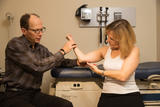
Developing New Treatments
McCaig Institute researchers are working to provide novel, safe and effective treatments for people with osteoporosis, rheumatoid arthritis, osteoarthritis and other bone and joint conditions.

Developing safer stem cell therapies
Private clinics around the world advertise astonishing healing results from stem cell therapy, many promising complete tissue regeneration. But, in fact, these treatments are unproven. “Currently, no evidence has been provided from placebo-controlled clinical trials that stem cell therapy provides any long term benefits to patients with osteoarthritis or cartilage injury,” says McCaig Institute researcher Dr. Roman Krawetz, PhD.

Inflammation and fracture healing
Orthopaedic trauma surgeon Prism Schneider spends half her time performing surgery and treating orthopaedic trauma cases, and the other half doing research on how inflammation affects fracture healing and an individual’s risk of developing blood clots or excessive bleeding.

Help for stiff elbows
Asthma medication may prevent loss of joint motion following an injury
One cold morning in January 2015, Jacqueline Burrus ran to catch a bus and slipped on the ice. She put her right arm out to break her fall, and in that instant her life changed forever. “I hit the ground, got up right away, brushed the snow off my coat and walked on the bus. It wasn’t until I sat down that I realized my elbow was killing me.” An x-ray and CT scan confirmed she had multiple fractures in the bones that make up the elbow – the radius, humerus and ulna – and she was immediately scheduled for surgery.

Bridging the gap between veterinary and human musculoskeletal health
Certain types of musculoskeletal injuries occur naturally in both horses and humans, and the anatomy is remarkably similar. For example, the athletic injury of the equine superficial digital flexor tendon is very similar to an Achilles tendon injury in humans. Dr. Holly Sparks’ work on equine tendon injury will not only be important within the field of veterinary medicine but can also be readily translated to comparable human conditions.

Advances in regenerative medicine
A team of McCaig Institute researchers at the Cumming School of Medicine, Schulich School of Engineering and the biomedical engineering graduate program has developed a way to make large quantities of pluripotent stem cells that maintain their effectiveness.

